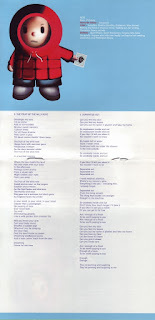Anoraknophobia is the 12th studio album, and 19th overall, by the British rock band Marillion, released in 2001. It is regarded as the first instance of a music recording completely financed by fans in a then-unique fundraising campaign, as more than 12,500 copies were pre-ordered before the album was even recorded.
In an attempt to depart from their neo-progressive rock past for a contemporary sound, Marillion introduced elements of rap, groove, funk, trip hop, blues, jazz and dub. Although the album received several favourable reviews, it was not a significant commercial success, and its sole single, "Between You and Me", did not chart. The group supported Anoraknophobia with a six-month European tour.
In February 1997, when Marillion prepared for a European tour in support of their ninth studio album, This Strange Engine, Mark Kelly announced on the Internet that the group would not visit North America due to insufficient support from their American record label, Red Ant. Then, devoted fans launched a fundraising drive and raised $50,000 to help their favourite band cross the Atlantic. Alliance Entertainment, Red Ant's parent company, filed for bankruptcy in July and tried to sell the label. As a result, an additional $15,000 (money that would have come from Red Ant) was raised for a 21-date North American tour, the band's largest since 1991. The whole idea, known as crowdfunding, was conceived and realised by fans without any involvement from the band, and although music lovers had always backed their favorite performers in various ways, such a successful Internet campaign was unprecedented.
After releasing marillion.com in October 1999, Marillion had completed a three-album contract with Castle Communications. Although a number of independent labels were interested in signing the band, its members wanted to have total control of their music and still be able to use distribution facilities of a major record company. This could only be achieved if the money to create an album was obtained from a different source, and Marillion found an unusual solution, crowdfunding.
As they had already learnt of the dedication of the fanbase which had underwritten the North American tour, the band sent e-mails to over 30,000 people who subscribed to their website, asking whether they would buy an unrecorded album. Within two days there were around 6,000 positive replies; ultimately, 12,674 copies were pre-ordered. The process raised more than £150,000 (£228,000 in 2015 pounds), more than an advance the band might have received from an ordinary record contract. A worldwide marketing and distribution deal was concluded with EMI, and the album would be released for retail by their Liberty Records imprint.
This innovative pre-order venture was unexpectedly successful. Anoraknophobia is claimed by Marillion to have been the first crowdfunded album in the music industry.
Anoraknophobia was written, recorded and mixed at the Marillion's own Racket Club studio in Buckinghamshire, England, for the whole of 2000 and early 2001. To work on the album, the band chose Dave Meegan who had previously been an assistant engineer on Fugazi (1984) and had produced their last two recordings with EMI, Brave (1994) and Afraid of Sunlight (1995). Stewart Every assisted at mixing of the album.[citation needed]
Bassist Pete Trewavas, said the band had not had any tracks left over from previous sessions which could have been used, so the entire album was written "from scratch". Since they had been unfashionable in the eyes of the media and had been largely ignored by the music press, Marillion deliberately attempted to create a modern sound and distance themselves further from their neo-progressive rock past. In an interview with the BBC, Hogarth spoke about the band's new musical direction and the album's diverse influences: "With this album there's been a massive invasion of black influence–there's rap, there's groove, there's funk, there's trip hop, blues, jazz, dub." Thus, the songs "Between You and Me" and "Map of the World" have drawn comparisons to U2, while the nine-minute "Quartz", which contains a rap section, has been compared to the sound of Massive Attack.
All the samples in "Separated Out" were taken from Tod Browning's horror film Freaks (1932). The line "Freaks!... Freaks!... Freaks!" at the ending of the track was used as a reference to Marillion's fans who sometimes refer to themselves as "freaks" after a Fish-era B-side. The phrase "She was only dreaming" in the song "If My Heart Were a Ball It Would Roll Uphill" is a sample from "Chelsea Monday".
According to Hogarth, the title, nominally a play on the word "arachnophobia", or fear of spiders, means no fear of anoraks ("anorak no phobia"), referring to the long-running in-joke that Marillion fans are also sometimes called anoraks. The artwork for Anoraknophobia as well as some other related music releases and press materials feature cartoon graphics of a boy named Barry who wears a rain parka. Inside the liner notes for the pre-order edition of the album, there is a photograph of each of the band members posed in a similar manner and standing near a telephone box.
Track listing
All lyrics are written by Steve Hogarth, except "Map of the World" by Hogarth and Nick Van Eede; all music is composed by Marillion.
- "Between You and Me" 6:27
- "Quartz" 9:08
- "Map of the World" 5:01
- "When I Meet God" 9:16
- "The Fruit of the Wild Rose" 6:58
- "Separated Out" 6:15
- "This Is the 21st Century" 11:05
- "If My Heart Were a Ball It Would Roll Uphill" 9:30
Total length: 63:31
























































